Root, designed by Cole Wehrle and illustrated so well by Leder Games house artist Kyle Ferrin that it would feel wrong to leave him off the masthead, has a lot of expansions. What’s more, those expansions are popular. I don’t know what Leder’s internals look like, but speaking from my own experience as the inventory manager of a board game store, I can tell you that the big Root expansions sell nearly as well as Root itself. If you buy Root and you like it, there’s a good chance you’ll end up buying at least one or two.
As an avowed Root fan myself, I certainly encourage you to do so! Root is thus far remarkable for having no bad (non-bot) expansions. They are all worthwhile, and each adds something different. Taken as a whole, the expansions are spices on the rack. With so many to choose from at this point, it can be difficult to decide which ones to prioritize. This guide, which will be updated with each and every future Root release for as long as can be managed, is here to help.
Each expansion includes a brief discussion of what’s inside, a lengthier discussion of same, and a bullet list highlighting who that expansion is for. That last one will give you the quickest overview of what’s going on. While this guide is written assuming some familiarity with the base game of Root, it has also been written to help people who are looking for gifts for Root-afflicted friends and family.
Alright. Let’s Root around.
Faction Expansions
 The Marauder Expansion
The Marauder Expansion
What’s in the box:
The Marauder Expansion introduces the Lord of the Hundreds and the Keepers in Iron, as well as Hirelings that correspond to the four factions in the base box. It also introduces advanced setup, which launches Root into the stratosphere as a serious competitive game.
The details:
The Marauder Expansion was made with two- and three-player games of Root in mind. Both The Lord of the Hundred and the Keepers in Iron have a large board presence, which is essential for encouraging player interaction in a smaller game, and the Hirelings are all about making the woodland feel more alive. They jump control back and forth from player to player, turning up the entropy in a way that successfully captures the barely-controlled chaos of a full game of Root.
The Lord of the Hundreds is a powerful, stupid (complimentary) faction, a ball of destruction rolling from one edge of the board to the other. They’re a great starter faction, because it is relatively hard to paint yourself into a corner. The Keepers in Iron are the opposite; this might be the most difficult faction to play well. The contrast between the two is ultimately to Marauder’s benefit; there is something in here for everyone.
The Hirelings fill the board with mini-factions that help approximate higher-player count games. They also act as a bit of a catch-up mechanism. They don’t stay under the control of the leading player for as long as they’ll stick with those who are behind on points. They’re an excellent solution to Root’s constrictive player count issues, but be wary: I would not recommend new players play with them. They add a bit too much to keep tabs on until you’re already comfortable with the bigger picture.
Advanced Setup changes the way factions are drafted and setup on the board. The changes it makes are not particularly complex or involved, but they introduce greater variety into the early stages of the game.
This expansion is great for:
- People who often play at lower player counts
- People looking for two new large armies to add to their roster
- People looking for a great option for new players and for experienced players
The Riverfolk Expansion
What’s in the box:
The main draws here are the two new factions, the Riverfolk Company and the Lizard Cult, but Riverfolk also comes with a second Vagabond board and three new Vagabonds, as well as the first edition of the Mechanical Marquise, an automated opponent that can be used in either competitive or cooperative modes.
The details:
The Riverfolk Company and the Lizard Cult are two of my favorite factions. The Riverfolk Company relies in large part on selling cards and services to other players, which makes them an ideal faction for an experienced player who’s introducing newer players to the game. The more knowledge a player has about the game, and how their cards and services can be useful for other players, the more of a salesman they can become. With newer players, you can work general strategy advice into your pitch, while selling to a table full of experienced players leaves ample opportunity for sass and passive-aggression. Of all the factions in Root, the Riverfolk Company feels the most distinct, and the most like they’re adding something that was actively missing.
The Lizards, meanwhile, can pop up anywhere, at any time. They’re one of the sneakiest and rudest factions. They also provide a welcome balance to the board presence advantage afforded to larger militant factions like the Marquise and the Eerie, since killing them only makes them stronger. For all the ways in which they upset the status quo of the woodland, the Lizard Cult have long been my favorite faction to have in the game.
The extra Vagabond board gives players more options for higher player counts. While I don’t recommend playing Root above (or below, really) four players, a five- or six-player game runs smoother with two Vagabonds than it does without. The three included Vagabonds—the Scoundrel, the Arbiter, and the Vagrant—are the beginning of the Vagabond getting weird, and I mean that as a compliment.
The Mechanical Marquise is entirely unnecessary, and it has subsequently been replaced: Leder Games released a better version in the Clockwork Expansion a few years later.
This expansion is great for:
- People who enjoy being salesmen and politicking
- People who enjoy being a real pain in the tuchus
- People who regularly play Root at four players and want a little variety
- People who often find themselves introducing groups of new people to the game
The Underworld Expansion
What’s in the box:
Underworld includes two new factions, the Underground Duchy and the Corbid Conspiracy, as well as a new double-sided board, which introduces the Lake Map and the Mountain Map.
The details:
The Underground Duchy, affectionately known as the moles, are the most important thing in the Underworld box. Most of the best Root players I know prefer the moles, not because they are the strongest—though they are certainly one of the more competitive factions—but because they allow for a greater variety of play styles. Few factions provide as many options for tailoring your strategy to the other factions on the board. They were also the first expansion faction to wield an army that can go toe-to-toe with the Marquise and the Eyrie.
The Corvid Conspiracy are Root’s sneakiest faction. These mischievous magpies love nothing more than sewing chaos around the board, leaving behind plot tokens that threaten to trap opponents, steal their cards, or blow entire clearings straight to woodland heck. If playing bluffing games makes you giddy, the Corvid Conspiracy is the faction for you.
The new maps are great additions. Each encourages different strategies for every faction, and they both include a novel mechanic: the Mountain map introduces the first of Root’s landmarks, a tower in the central clearing that yields an extra point every turn, while the Lake introduces the ferry, which has big ramifications for movement during the game.
This expansion is great for:
- People who enjoy flexible strategy
- People who enjoy being sneaky and generally being up to no good
- People who want to change up the board
Other Expansions
The Clockwork Expansion and The Clockwork Expansion 2
What’s in the box:
The Clockwork Expansion introduces the Mechnical Marquise 2.0, Electric Eyrie, Automated Alliance, and Vagabot, automated opponents that can be used in any game of Root, whether you’re playing solo or with one or two friends/enemies. The Clockwork Expansion 2 adds bot versions of the factions from The Riverfolk and The Underground expansions.
The details:
The Clockwork Expansion uses various decision tree flowcharts to provide facsimile opponents for underpopulated games of Root. They are perfectly decent bots, in the sense that they are functional, but I don’t recommend playing with them. The politics of Root, the table talk and smack talk and negotiations, are a crucial part of what the game is about. If this is your only option, if you must needs play Root in a vacuum, you’re better off getting the excellent Dire Wolf Digital application. If you are looking for something to fill out a game with two or three players—Root really is better at four—I would instead steer you towards the subsequently-introduced Hirelings expansions.
That said, if you simply must have everything, or you are both alone and digital-averse, The Clockwork Expansion does what it says on the tin. You could even do what my roommate did over a particularly boring weekend during COVID lockdown and facilitate a game amongst all four bots. Clockwork doesn’t feel like Root. It’s something else entirely.
This expansion is great for:
- People who have no options for playing Root either digitally or with other people
- Absolute completists
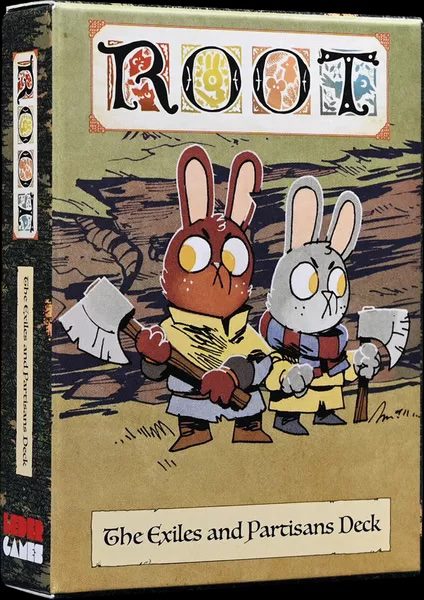
The Exiles and Partisans Deck
What’s in the box:
A new deck of cards to be used in lieu of the deck included in the base game.
The details:
Exiles and Partisans is the only expansion for Root that I think is entirely necessary. No player who owns Root should be without it. The new cards introduce a variety of new abilities while eliminating others that have come to be viewed as too unbalanced over time. They shake up the game’s strategic possibilities, change the feel of everything, and increase the overall aggression level of the game. 10/10. No notes.
This expansion is great for:
- People who own Root
Hirelings Packs
What’s in the box:
Each Hirelings Pack includes the Hirelings that correspond to whichever faction expansion the pack is named after. The Marauder Hirelings Pack comes in a larger box which can hold all of the Hirelings.
The details:
The Hirelings are intended to fill out the board in games with lower player counts. Player choices and the entropy they incur are a big part of Root, and it’s hard to generate that in games with only two or three players. There are simply not enough changes to the woodland from round to round. The Hirelings address that by giving the player(s) who control them extra actions. The fewer players are in the game, the more Hirelings you add, and the stronger their actions become. Careful, though; the Hirelings know no real master, and they will jump from player to player.
If you’re choosing between Hirelings packs, I would actually recommend choosing whichever pack corresponds to the factions you like the least, or to whichever ones you don’t own, since the rules forbid playing a game with a faction and Hirelings that match. They’re all good, though. There’s no going wrong here.
This expansion is great for:
- People who often play at lower player counts
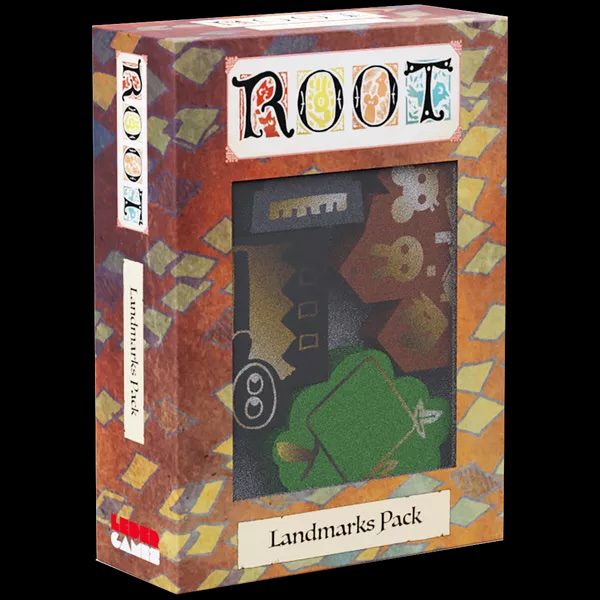
Landmarks Pack
What’s in the box:
Four wooden landmark tokens.
The details:
The Landmarks, foreshadowed by the tower in The Underworld Expansion, are physical features that can be added to clearings on the board. None of them are earth-shattering, but each changes some aspect of the game just a bit. This is the least essential expansion for Root, while simultaneously being the easiest to learn and implement besides The Vagabond Pack.
This expansion is great for:
- Completists
- People who want a little treat
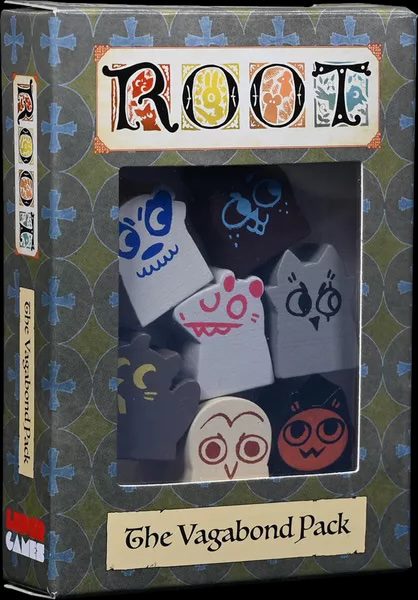
The Vagabond Pack
What’s in the box:
Three new Vagabonds and seven meeples that correspond to each of the non-raccoon Vagabonds released up to that point.
The details:
That’s about it, really! The Vagabond Pack introduces three new Vagabonds, including the agile Harrier, the battle-happy Ronin, and the malleable Adventurer, all of whom increase the variety available to your friendly local varmint. They’re all great additions, but the real draws here, the seven meeples, are entirely aesthetic. If you’ve ever looked forlornly at the possum on your Vagrant card and the raccoon meeple on your board and thought, “but…but…they don’t match,” then The Vagabond Pack has a solution for you.
This expansion is great for:
- People who love playing as the Vagabond
- People who strive for fastidious representational realism within the confines of their heavily abstracted board games


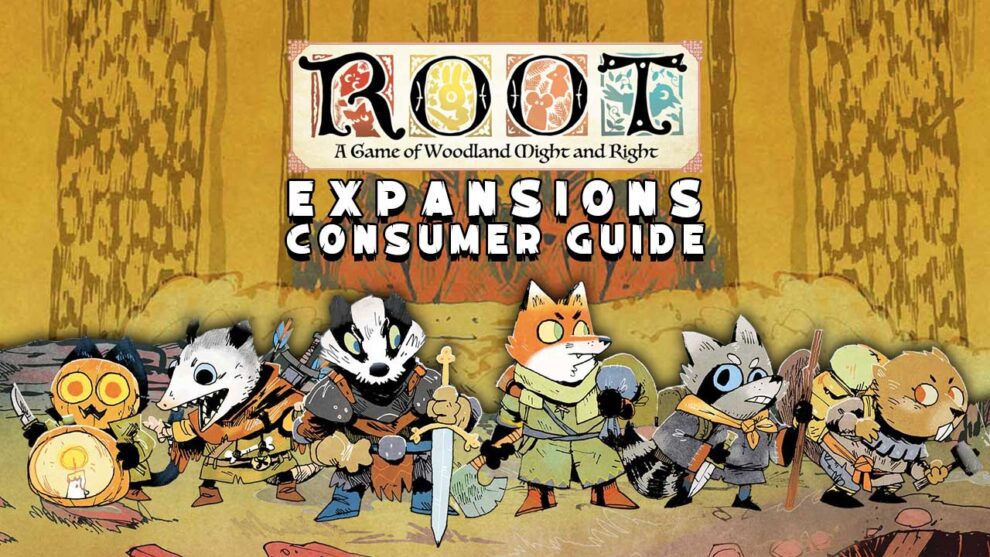

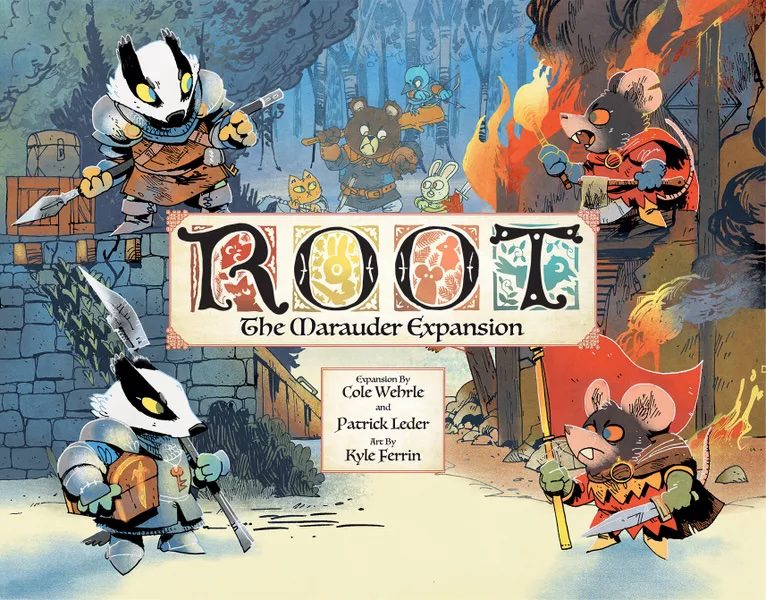 The Marauder Expansion
The Marauder Expansion
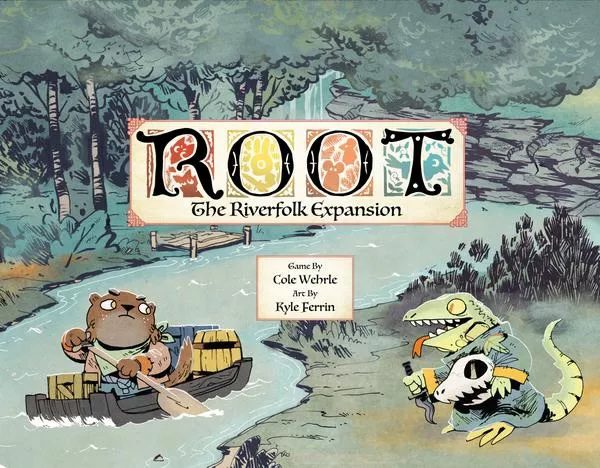

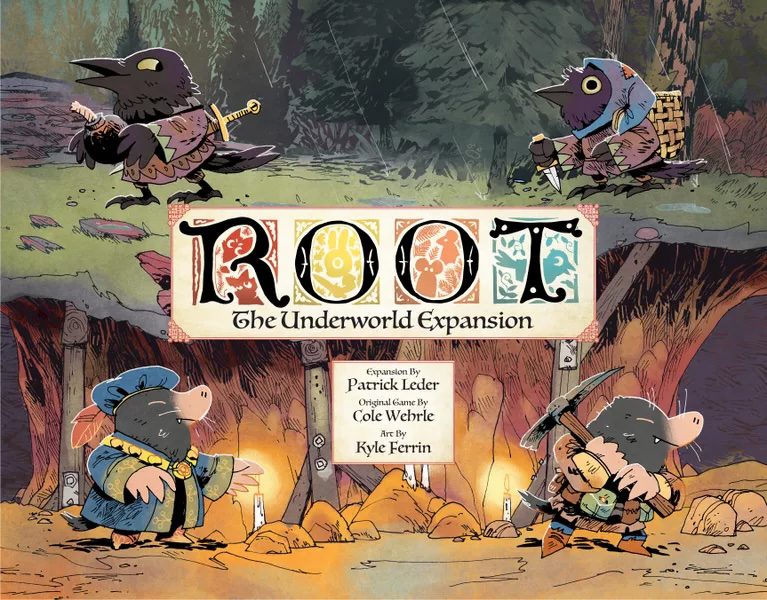

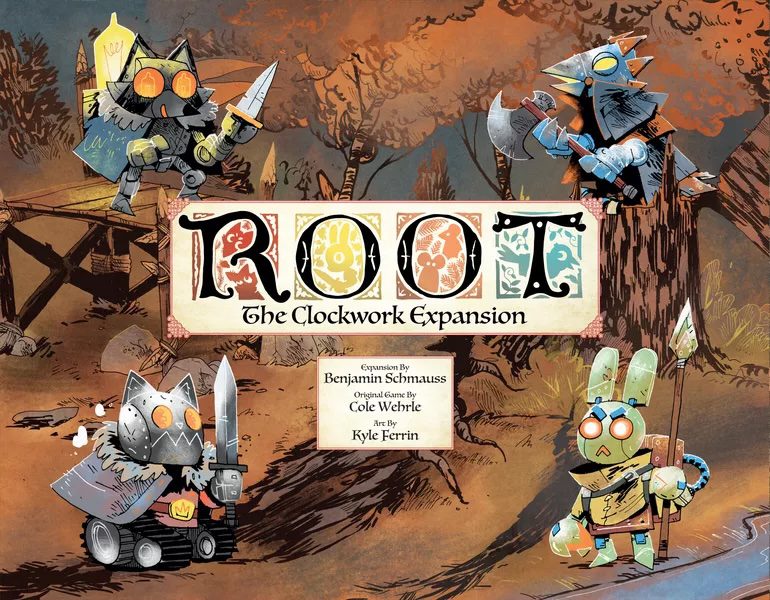

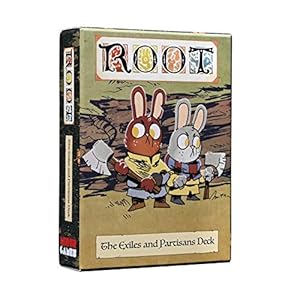
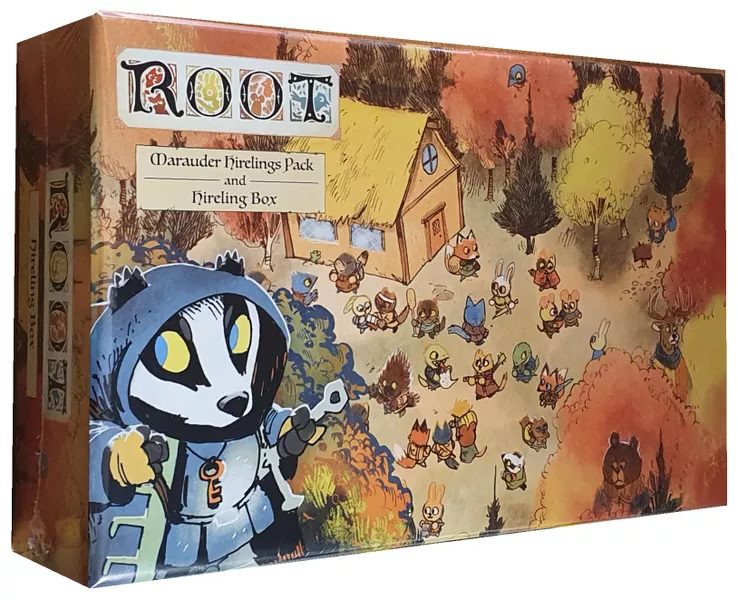








Such a well done, comprehensive and really useful article! Thanks!
Thank you! I hope it proves useful for people.